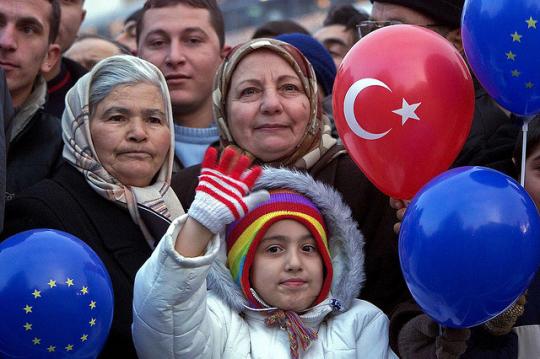 The EU-Turkey customs union (CU) has been a key catalyst in the economic transformation of Turkey over the past two decades and an effective mechanism for deeper integration between the two parties, according to a new World Bank evaluation of the CU.
The EU-Turkey customs union (CU) has been a key catalyst in the economic transformation of Turkey over the past two decades and an effective mechanism for deeper integration between the two parties, according to a new World Bank evaluation of the CU.
While its supporters and critics may continue to debate in the political arena, this much is now clear: the CU has brought enormous benefits to Turkey and has done more to facilitate trade than a free trade agreement (FTA) would have. But more can still be done to both modernize the agreement and deepen trade integration between the parties.
The CU remains a unique and pioneering agreement. Originally designed as an effort aimed at smoothing the path towards Turkey’s accession into the EU, the CU has helped lower barriers to trade between the two parties by eliminating tariffs on bilateral trade in most industrial goods, requiring Turkey to adopt the EU’s low common external tariff for these products (including its FTAs with third countries), and aligning Turkey’s technical regulations with the EU acquis.
Nearly 20 years later, Turkey has still not joined the EU, and this has left some questioning the relevance of the CU. What has been its true economic impact? Has it helped or hindered the Turkey’s trade and investment relationships with the EU and the rest of the world? Is it still a useful tool for integration in a more interdependent global economy?
The evaluation shows that with the CU, exports from Turkey to the EU are up to 7.2 percent higher than they would have been under an FTA, while EU exports to Turkey are as much as 4.2 percent higher. Contrary to the claims of its critics, therefore, the CU has clearly been effective in boosting trade and FDI between the parties.
While the first best solution to further deepen integration remains full accession of Turkey to the EU, there are steps that can be taken to modernize the trade relationship in the interim. An extension of the trade agreement beyond industrial goods to cover primary agriculture and services trade would bring gains to both parties. These two sectors account for 10 and 60 percent of Turkey’s GDP, respectively. Liberalizing cross-border services trade could bring static gains of an estimated US$1.1 billion to Turkey, according to the evaluation, while including primary agriculture in the CU would bring an additional gain of US$840 million.
Opening both services and agriculture trade would also fall in line with recent trends in other FTAs. Slow progress in the World Trade Organization’s (WTO) Doha Round of multilateral trade negotiations has motivated some of its members, including Turkey and the EU, to seek regional solutions. But this is also an evolving trend. Recent FTAs, including proposed “mega-FTAs” such as the Transatlantic Trade and Investment Partnership (TTIP) between the US and EU, tend to include commitments on services, investment, agriculture, and public procurement, to name but a few—provisions that go much deeper than simple rules on goods trade. Turkey’s interest in becoming a partner in TTIP thus implies significant liberalization of services and possibly agriculture – an opportunity to also increase the benefits of the CU with the EU.
At a recent launch of the evaluation in Istanbul and Brussels, Turkish representatives and counterparts expressed concern over asymmetries in EU FTA negotiations. As the EU signs FTAs with third countries, Turkey is sometimes unable to reach parallel agreements with these third countries despite the CU. For example, Turkey has yet to conclude equivalent EU-FTAs with Algeria, South Africa, and Mexico. As a result, Turkish firms do not receive improved access to these markets, while imports from these third countries can enter Turkey duty-free via the EU even in the absence of an agreement. The costs from a failure in Turkey being able to reach a similar agreement to the EU with the US under TTIP would be larger.
While the best solution would be joint negotiations, the institutional realities of the EU do not allow Turkey, as a non-member, a seat at EU FTA negotiations with third parties. Nevertheless, without adequate Turkish participation, there is a risk that rules of origin be introduced on goods entering Turkey from the EU. This would be a big step backward, as the evaluation finds that the absence of rules of origin requirements under the CU has been one of the primary benefits over a simple FTA between the parties.
Asymmetries also exist in other decision making areas related to the CU. For example, while Turkey has the obligation to align with the policy and legislation of the EU, the formal provisions in the CU agreement were designed to allow Turkey to participate in decision shaping, not decision making. Furthermore, those provisions on institutional cooperation and decision shaping have not been properly implemented and used, which increases the risk of non-compliance. There is therefore a need to make the arrangement work in a more balanced way in order to maximize the benefits of the CU for both parties.
Asymmetries are closely related to other concerns over the fair treatment and free movement of Turkish goods and professionals looking to trade with the EU. The evaluation also makes recommendations on these, specifically road transport permits—especially for transit—needed for Turkish trucks to enter the EU and on the perceived restrictiveness of EU visas for Turkish business travelers. These “irritants” increase trade costs.
The EU also has concerns with the current functioning of the CU that it feels are not being fully addressed. The transposition of the EU acquis into Turkish law could be made more transparent and systematic. Turkey has sometimes failed to provide the European Commission with the English-language translations of its transposed laws that are needed to verify Turkish technical regulations have been aligned with the acquis. This has resulted in a ‘notification deficit,’ meaning that EU customs officials, market surveillance bodies, and exporters do not know the status of actual laws on the books in terms of Turkish transposition.
The current design of the dispute settlement mechanism (DSM) under the CU is another area of concern for EU counterparts. Its use is currently limited to disagreements on the duration of safeguard measures, and requires both parties to agree to bring a dispute. As a result, actual disputes are never heard and never resolved, including those pertaining to various trade irritants that inevitably arise in any successful trade agreement.
These shortcomings can be resolved.
First, widening the CU to cover primary agricultural products and services trade would deliver economic gains to both sides. Second, parallel negotiations for FTAs between Turkey, the EU, and third parties should be formalized. These would mirror the main EU negotiations and aim to start and finish at about the same time. Asymmetries in other areas of decision making could also be reduced by establishing ‘Friends of Turkey’ working groups and increasing Turkish representation on comitology committees. Third, liberalizing road transport permits and establishing a ‘green lane’ for pre-qualified Turkish business people looking to travel to the EU on business would help boost EU-Turkey trade. Fourth, a formal mechanism is needed to ensure transparency in Turkey’s transposition of the acquis. And finally, an improved DSM could help ensure market access is fair, obligations are being met, and that trade irritants can be addressed in a timely manner.
Each of these recommendations is outlined in the evaluation in greater detail. However, they must be properly sequenced and addressed collectively for the promise of a strengthened EU-Turkey trade relationship to be realized. A piecemeal approach would inevitably lead to winners and losers on specific details, and likely result in stalemate. Rather, by packaging these reforms together all parties should be able to envision further gains.



Join the Conversation